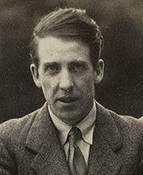 W. J. Turner
W. J. Turner Interesting because it reveals that the discombobulation of rational thinking which, in the name of identity politics, blights the work many of today’s scholars and professional intellectuals, is not a unique phenomenon. Surprisingly – a least it is to me – writers in the 1920’s and 1930’s, even those who have earned niches in the literary cathedral, where devotees now come to adore, contemplate and pray, also were victims of the political fallacy. In their case, the ideology that inspired their rational discombobulation was Marxism.
Turnstile One contains a breathtaking example of the political fallacy.
§ A dogmatically dotty view of J. S. Bach by W. J. Turner.
The reevaluation of once admired artworks is a common consequence of the political fallacy – just look at the hysteria that gripped museum curators after the “discovery” of Chuck Close’s bad sexual behavior. That sort of anxious idiocy pales, however, next to the stunning – call it sublime – idiocy of W. J. Turner in his 1922 essay, reprinted in Turnstile One, “Bach”.
Walter J. Turner (look him up) was a poet, novelist, whatever, who wrote a great deal about music. “Bach” obviously was written while Turner was going through his Marxist phase – a seemingly mandatory rite of passage for most writers of the period. Disconcerted by the conflict between his appreciation of Bach’s religious music and his indubitable belief that religion is capitalist hoax, Turner concludes that the spirituality we hear in Bach is only make-believe. This leads him to the startling remark that Bach was “a musical genius [of] tremendous vitality, but of little spiritual originality.”
Turner’s convoluted argument includes such gems as:
Those Lutheran Christians were a vigorous stock: they could listen to immensely long sermons and cantatas with a dogged indifference to physical distress. This indifference to the weariness of the body may be regarded — has been regarded — as a triumph of spirit over matter, but it is just my point that their spirituality consisted of no more than this and that they imposed it intellectually upon themselves.
Turner sums up his screed with:
There is no harm in admiring Bach's Cantatas and Passions, Wagner's Parsifal and Puccini's Madam Butterfly, so long as we keep our tongue in our cheek.
So much for Coleridge’s willing suspension of disbelief.
(While the tongue-in-cheek connoisseur will be indifferent to the profundities of Parsifal and the pathos of Madam Butterfly, he or she might be especially primed to appreciate the depths of much of Shostakovich – unless, of course, he or she is, like Turner at this juncture, a devoted Marxist.)
Turner ends with:
There is even virtue in recognizing that Bach had more intellectual and emotional power than an infinite number of Puccinis and Stravinskys. But Bach a great religious composer! Oh dear, no!
[TO BE CONTINUED]
 RSS Feed
RSS Feed